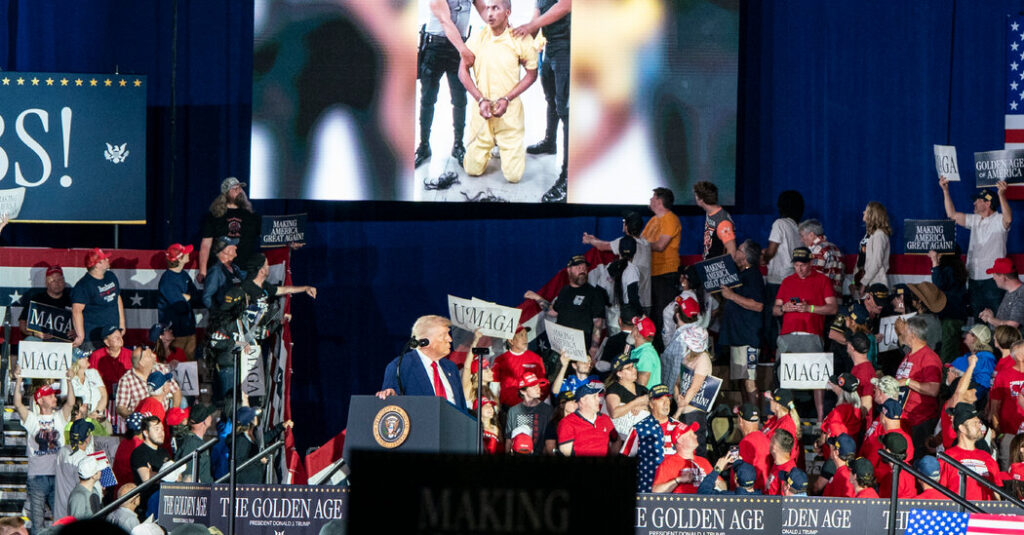A federal judge on Wednesday night expressed skepticism about the Trump administration’s reasons to avoid seeking the return of scores of Venezuelan immigrants who had been expelled to El Salvador in March, saying he was inclined to order officials to provide more information on the arrangement between the American and Salvadoran governments.
The questions raised by the judge, James E. Boasberg, came at a hearing in Federal District Court in Washington, where lawyers for the deported men claimed that because the administration had sent them to a prison in El Salvador under an apparent agreement with the Salvadoran government, it should be responsible for facilitating their return to U.S. soil.
Over the past several weeks, lawyers for the American Civil Liberties Union have secured orders from judges in several courts across the country stopping the Trump administration from using the Alien Enemies Act, an 18th-century wartime law, to summarily deport Venezuelans accused of being gang members to a terrorism prison in El Salvador.
But at least so far, the lawyers have not been able to protect about 140 Venezuelan migrants who are already in Salvadoran custody after the United States sent them on charter flights under the act on March 15.
The hearing in Washington on Wednesday night was held in part to debate two crucial issues: what role the Trump administration played in having the men detained in the Salvadoran prison in the first place, and whether officials could be held accountable for bringing them back to the United States.
In seeking to answer the first of those questions, Judge Boasberg pressed a Justice Department lawyer about a recent statement by President Trump concerning Kilmar Armando Abrego Garcia, a Salvadoran man who was wrongfully expelled to El Salvador in the same set of flights as the Venezuelan migrants.
During an interview with ABC News this month, Mr. Trump said that he could tell the Salvadoran government to send Mr. Abrego Garcia back to the United States if he wanted, but that he simply did not care to do so.
“Was the president telling the truth when he said he could pick up the phone and he could get Mr. Abrego Garcia released or not?” Judge Boasberg asked the Justice Department lawyer, Abhishek Kambli.
After a pause, Mr. Kambli told Judge Boasberg that the president sometimes believes he has more authority than he actually does and that the final decision about whether to release the Venezuelan men rested solely with the Salvadoran government.
The plight of the 137 Venezuelans being held in the notorious terrorism prison in El Salvador known as CECOT is significant for several reasons.
Lawyers for the A.C.L.U. have claimed that the men were sent there in the middle of night without due process. They have also argued that Mr. Trump’s use of the Alien Enemies Act to remove them from the country was unlawful and improperly stretched the meaning of the law — a view that a ruling from a Trump-appointed federal judge in Brownsville, Texas, supported last week.
The Justice Department, acting on behalf of the White House, has argued that once the Venezuelan men were sent to El Salvador, they were beyond the reach of the U.S. court system. Lawyers for the department have also taken an expansive view that federal judges have no authority to tell the executive branch how to handle immigration issues or matters of foreign policy, including national security.
As the hearing on Wednesday came to an end, Judge Boasberg said that lawyers for the Venezuelan men had made a decent case that the Trump administration had at least some responsibility for how they had ended up in Salvadoran custody.
He pointed to a series of public statements by officials in both the American and Salvadoran governments that suggested there was an agreement in place between the two countries.
In response, Mr. Kambli, the Justice Department lawyer, said that he was “not going to parse out every public statement” that had been made on the matter by U.S. officials.
Judge Boasberg, highlighting the way that Trump officials have often said one thing in media outlets and another in court, asked Mr. Kambli almost derisively: “Is that another way of saying these public statements just aren’t true?”
In the end, Judge Boasberg put off ruling on the request by the A.C.L.U. to issue an order that the Venezuelan men should be returned from El Salvador.
Instead, the judge said that he intended to order the government to disclose more information about its arrangements with El Salvador by having it answer written questions and hand over a series of documents.

